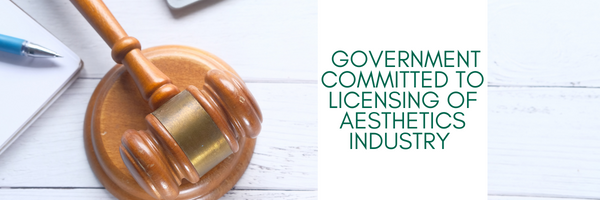In January 2023, it has been confirmed that the UK government will go ahead with their commitment on licensing the non-surgical aesthetics sector in England.
This has come as a massive breakthrough for the industry and those who have campaigned to have such licensing in place.
Detailed in a press release by the JCCP (Joint Council for Cosmetic Practitioners) they explain, “The JCCP, British Beauty Council, and the Chartered Institute for Environmental Health (CIEH) have received assurance from the UK Government that it’s committed to the licensing of the non-surgical aesthetics sector in England. After submitting a joint letter on behalf of the aesthetics industry to the Department of Health and Social Care, the industry bodies received a response outlining how the department is designing and implementing a new system of licensing for the non-surgical cosmetic industry. This comes after the Government made its initial commitment in March 2022 to bring forward future regulation to protect patient safety by making it an offence for someone to perform these cosmetic procedures without a licence.”
In response to their letter, Maria Caulifield, Parliamentary Under-Secretary of State for Mental Health and Women’s Health Strategy, stated “departmental officials will work as quickly as possible to introduce the licensing scheme and will consider all the important areas.”
Seen as an aftermath from ITV’s expose on the industry and its challenges in regulation aired in January 2023.
Key Priorities Set for Licensing Aesthetics Industry
There have been some key priorities set for the Government to action as it approaches the licensing of the aesthetics industry, these are as follows:
- The design and implementation of a national licensing scheme for all premises where licenced procedures are conducted as well as practitioners of non-surgical cosmetic procedures to ensure that all those who practise invasive procedures are competent and safe for members of the public (as proposed in Paragraph/Clause 180 of the Health and Care Act, 2022).
- A requirement for all practitioners to hold adequate medical insurance in order to provide non-surgical cosmetic procedures.
- The development of official guidance on the training and qualification expectations for all practitioners, including knowledge and application of infection controls and first aid training.
- The development of a system for the effective recording of adverse incidents and public awareness raising to ensure that all cases that go wrong can be tracked and improvements to safety made as a result. Members of the public need better tools and knowledge in order to protect themselves.
Agreeing on these terms, Maria Caulifield also commented “We know this is a fast-moving sector, and officials will consider how best to future-proof the regulations so that new and emerging treatments are captured by the scheme.”
We await to hear the outlined timetable from the UK government for the implementation of the new licensing scheme, this is anticipated within the next few weeks.
Cosmetic Courses Values
Since we set out training in 2002, we have only trained medical professionals in injectables and have stuck by this through our 21 years of training since. Led by Consultant Plastic Surgeon Mr Adrian Richards, our faculty and support teams are passionate about safety within aesthetics, and we do our utmost to ensure we produce confident and safe injectors.
Both Mr Richards and our Managing Director Jim Savin are vocal members on the JCCP board in advocating for a safer, regulated future in aesthetics.
Our Level 7 Diploma was created inline with the JCCP guidelines and has three pathways to complete, those who have succesfully undergone Level 7 training will be added to the JCCP register, confirming their high standard of learning and regulation.
If you would like to find out more about our training courses and our Level 7 Diploma please contact us on 01844 390110 / [email protected].








